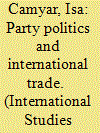| Srl | Item |
| 1 |
ID:
117528


|
|
|
|
|
| Publication |
2012.
|
| Summary/Abstract |
How does party politics influence trade outcomes? Previous studies offer a limited understanding of the role of political parties in trade policymaking due to their restrictive assumptions that downplay the distinct organizational identity of political parties and the competitive logic of their interactions. This paper develops a theoretical argument that emphasizes the competitive forces of party politics as a key determinant of party preference for trade and hence of trade outcomes. This theoretical argument is illustrated and tested in analysis of the trade implications of strategic interactions between mainstream parties and niche parties. The empirical analyses confirm that party strategic factors need to be assigned a substantial analytical weight in explaining trade outcomes.
|
|
|
|
|
|
|
|
|
|
|
|
|
|
|
|
| 2 |
ID:
146149


|
|
|
|
|
| Summary/Abstract |
We examine the sector-specific distributive effect of war in the US economy. We argue that war generates sector-specific distributive effects via demand-side and supply-side mechanisms. We also claim that war's distributive effects materialize over time. Our empirical analysis utilizes a panel data set with 22,354 U.S. firms for the period from 1960 to 2007. It probes the impact of the U.S. Government's war making on firm performance in the U.S. arms and non-arms (hybrid and civilian) sectors in both the short and long runs. Our analysis shows that war does not always affect U.S. non-arms sectors adversely. Indeed, war exercises a positive total long-run effect for these sectors. It also finds that the supposedly positive distributive effect of war for U.S. arms sectors proves weaker than analysts generally assume. Finally, it demonstrates that war-induced demand and supply shocks can explain these results. Overall, our research sheds light on a relatively understudied aspect of war and advances the general understanding of the political microeconomy of war making.
|
|
|
|
|
|
|
|
|
|
|
|
|
|
|
|
| 3 |
ID:
099485


|
|
|
|
|
| Publication |
2010.
|
| Summary/Abstract |
Notwithstanding the troubled past and uncertain future of its relations with the European Union (EU), Turkey persists in its bid for membership in the EU. What accounts for Turkey's continuing pursuit of EU membership? We argue that the historical and institutional trend of modernization has locked Turkey into a pattern of domestic and foreign policies which is difficult, if not impossible, for current policymakers to break or reverse. As part of its modernization process, Turkey chose to follow a Western-oriented foreign policy, which became entrenched during the Cold War era with increasing returns or positive feedback from its overall engagement with the West and Europe in particular. Hence, the policy choices of Turkish policymakers about the EU are constrained by historical and institutional factors.
|
|
|
|
|
|
|
|
|
|
|
|
|
|
|
|